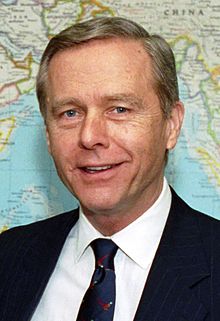Pete Wilson
Peter Barton "Pete" Wilson (born August 23, 1933 in Lake Forest , Illinois ) is an American politician ( Republican Party ). He was Governor of California and represented this state in the US Senate .
Life
Pete Wilson was born in the Chicago suburbs to a jeweler. Because of the family's move to St. Louis , he spent his school years at a private school in St. Louis County . In the fall of 1952 he began studying English at Yale University , which he completed with a bachelor's degree. He was awarded a United States Marines Reserve Officer Corps Fellowship . After three years of service in the infantry of the Marines he studied at the Boalt Hall School of Law at the University of California at Berkeley Law .
In 1962 he worked for the election campaign team of Richard Nixon , the Republican candidate for the office of governor, and met his advisor Herb Klein know, who recommended him to be active in San Diego in politics. Wilson moved to San Diego in 1963, where he was initially a criminal defense attorney and later practiced as a lawyer. In 1964 he supported Barry Goldwater in his futile efforts for the presidency. His commitment led to senior Republicans in the city supporting his bid for a seat in the California State Assembly . At the age of 33 he was elected to succeed Clair Burgener in the House of Representatives, to which he was a member from 1967 to 1971. From 1971 to 1982 he served as mayor of San Diego .
In 1982 Wilson ran for election to the US Senate and won against the then Democratic Governor of California, Jerry Brown . With his re-election in 1988 he was from January 3, 1983 to January 7, 1991 in office as a senator; he was a member of the Armed Forces Committee and supported Ronald Reagan's SDI initiative.
On January 7, 1991, Wilson resigned as a senator after successfully running for governor of California in November 1990 . He prevailed against the former mayor of San Francisco and later US Senator Dianne Feinstein with 49% to 46% of the vote. In November 1994, Wilson was re-elected for a second term ending January 4, 1999. He won over Kathleen Brown with 55% against 40% of the vote very clearly. A law passed during the 1990s stood in the way of re-election, his successor in office was the previous Lieutenant Governor Gray Davis . During Wilson's tenure there was a strong economic boom in the state; Government spending was limited and school reforms were carried out, which among other things led to smaller class sizes and a generally binding curriculum. During his term of office, the deregulation of the electricity market in California falls, which was one of the main reasons for the energy crisis in California from 2001 to 2003 . Wilson often took a more moderate position on sociopolitical issues. For example, he rejected a ban on abortion (" Pro-Choice ") and thus opposed the majority opinion in his party. In addition to the severe race riots in Los Angeles in 1992 , to which the governor responded with a mobilization of the National Guard to restore public order, fall during his reign .
In 1996 he applied for the Republican nomination for election to US President; however, his election campaign was unsuccessful, partly because of health problems.
In October 1999, he was the Woodrow Wilson International Center for Scholars of the Woodrow Wilson Award of the Smithsonian Institution awarded. In 2007 a statue of him was erected in San Diego. After the end of his term of office, he was a member of various supervisory boards of companies and political bodies. In 2003 he supported the election campaign of Arnold Schwarzenegger against the then incumbent Governor Gray Davis.
Wilson is married and has two stepchildren and five grandchildren with his wife, Gayle Edlund.
Web links
- Pete Wilson in the Biographical Directory of the United States Congress (English)
- Pete Wilson in nndb (English)
- Pete Wilson in the National Governors Association (English)
| personal data | |
|---|---|
| SURNAME | Wilson, Pete |
| ALTERNATIVE NAMES | Wilson, Peter Barton (full name) |
| BRIEF DESCRIPTION | American politician |
| DATE OF BIRTH | August 23, 1933 |
| PLACE OF BIRTH | Lake Forest , Illinois |



